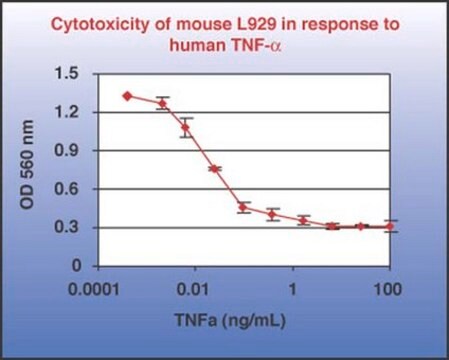F8146
Anti-Factor VII antibody, Mouse monoclonal
clone HVII-1, purified from hybridoma cell culture
About This Item
Produits recommandés
Source biologique
mouse
Niveau de qualité
Conjugué
unconjugated
Forme d'anticorps
purified immunoglobulin
Type de produit anticorps
primary antibodies
Clone
HVII-1, monoclonal
Forme
buffered aqueous solution
Espèces réactives
human
Technique(s)
indirect ELISA: suitable
western blot: 1:4,000
Isotype
IgG1
Numéro d'accès UniProt
Conditions d'expédition
dry ice
Température de stockage
−20°C
Modification post-traductionnelle de la cible
unmodified
Informations sur le gène
human ... F7(2155)
Description générale
Spécificité
Immunogène
Application
- the preparation of factor VII - depleted plasma and for purification
- sandwich-type immunoassays
- the evaluation of patients with hereditary factor VII deficiency by an enzyme linked immunosorbent assay (ELISA) or radio immunosorbent assay (RIA)
- the assay of factor VII level in patients with liver disease (a sensitive parameter of liver dysfunction)
- epidemiological studies of the importance of factor VII level as a risk factor for coronary heart disease, cerebrovascular disease and peripheral vascular diseases
- the determination of the activity state of factor VII in in vivo samples when used with a clotting assay
- flow cytometry
Flow cytometry/Cell sorting (1 paper)
Actions biochimiques/physiologiques
Forme physique
Clause de non-responsabilité
Vous ne trouvez pas le bon produit ?
Essayez notre Outil de sélection de produits.
Code de la classe de stockage
10 - Combustible liquids
Classe de danger pour l'eau (WGK)
nwg
Point d'éclair (°F)
Not applicable
Point d'éclair (°C)
Not applicable
Certificats d'analyse (COA)
Recherchez un Certificats d'analyse (COA) en saisissant le numéro de lot du produit. Les numéros de lot figurent sur l'étiquette du produit après les mots "Lot" ou "Batch".
Déjà en possession de ce produit ?
Retrouvez la documentation relative aux produits que vous avez récemment achetés dans la Bibliothèque de documents.
Notre équipe de scientifiques dispose d'une expérience dans tous les secteurs de la recherche, notamment en sciences de la vie, science des matériaux, synthèse chimique, chromatographie, analyse et dans de nombreux autres domaines..
Contacter notre Service technique